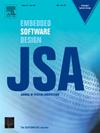RAFL: Reputation-Aware Federated Learning with hierarchical aggregation in LEO satellite networks
IF 4.1
2区 计算机科学
Q1 COMPUTER SCIENCE, HARDWARE & ARCHITECTURE
引用次数: 0
Abstract
The dynamic observation data of the Earth from Low Earth Orbit (LEO) satellites can be used for weather analysis, urban planning, etc. The existing satellite federated learning (FL) schemes have two main drawbacks. First, most of schemes rely on frequent communication between satellites and ground station. Due to the transient and unstable communication links, significant convergence delays are observed. Second, the possibility of unreliable and malicious participants preventing model convergence and degrading performance is not considered. To address the above issues, a secure and efficient FL scheme RAFL for LEO constellations is proposed. RAFL employs aerial networking and hierarchical FL to reduce interactions between satellites and ground station, thereby enhances training efficiency and model performance. A self-adaptive reputation evaluation system is designed that incorporates malicious behavior detection, historical behavior analysis, and performance and contribution assessments of LEO satellites. This system can detect and resist the actions of unreliable and malicious participants, and select appropriate leaders, thereby enhancing the robustness of FL. Extensive experiments show that RAFL not only effectively resists poisoning attacks but also improves the convergence time of FL while maintaining the accuracy of the global model.
低轨道卫星网络中具有层次聚合的声誉感知联邦学习
近地轨道卫星对地球的动态观测数据可用于天气分析、城市规划等。现有的卫星联邦学习(FL)方案存在两个主要缺陷。首先,大多数方案依赖于卫星和地面站之间的频繁通信。由于通信链路的暂态和不稳定,存在较大的收敛延迟。其次,不考虑不可靠和恶意参与者阻止模型收敛和降低性能的可能性。针对上述问题,提出了一种安全高效的LEO星座FL方案RAFL。RAFL采用空中组网和分层FL来减少卫星与地面站之间的交互,从而提高训练效率和模型性能。设计了一种自适应声誉评估系统,该系统集成了恶意行为检测、历史行为分析以及LEO卫星的性能和贡献评估。该系统可以检测和抵抗不可靠和恶意参与者的行为,并选择合适的领导者,从而增强了FL的鲁棒性。大量实验表明,RAFL不仅有效抵抗投毒攻击,而且在保持全局模型准确性的同时提高了FL的收敛时间。
本文章由计算机程序翻译,如有差异,请以英文原文为准。
求助全文
约1分钟内获得全文
求助全文
来源期刊

Journal of Systems Architecture
工程技术-计算机:硬件
CiteScore
8.70
自引率
15.60%
发文量
226
审稿时长
46 days
期刊介绍:
The Journal of Systems Architecture: Embedded Software Design (JSA) is a journal covering all design and architectural aspects related to embedded systems and software. It ranges from the microarchitecture level via the system software level up to the application-specific architecture level. Aspects such as real-time systems, operating systems, FPGA programming, programming languages, communications (limited to analysis and the software stack), mobile systems, parallel and distributed architectures as well as additional subjects in the computer and system architecture area will fall within the scope of this journal. Technology will not be a main focus, but its use and relevance to particular designs will be. Case studies are welcome but must contribute more than just a design for a particular piece of software.
Design automation of such systems including methodologies, techniques and tools for their design as well as novel designs of software components fall within the scope of this journal. Novel applications that use embedded systems are also central in this journal. While hardware is not a part of this journal hardware/software co-design methods that consider interplay between software and hardware components with and emphasis on software are also relevant here.
 求助内容:
求助内容: 应助结果提醒方式:
应助结果提醒方式:


